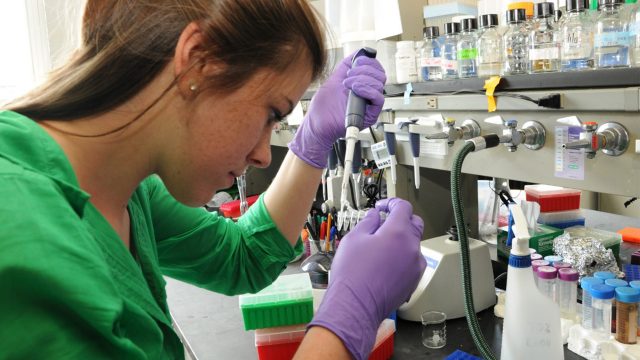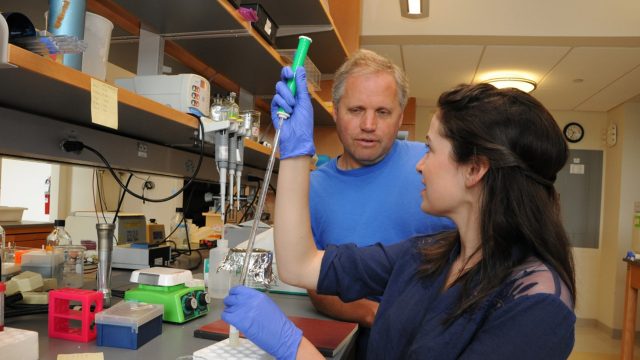With the awarding of a five-year, $19.9 million grant from the National Institutes of Health (NIH), Dartmouth’s Geisel School of Medicine and the University of New Hampshire will continue to lead efforts—together with their eight partner undergraduate institutions—to enhance biomedical research capabilities in the state as part of the New Hampshire IDeA Network of Biomedical Research Excellence (NH-INBRE).
The IDeA program builds research capacities in states that historically have had low levels of NIH funding by supporting basic, clinical, and translational research, faculty development, and infrastructure improvement.
“I am so pleased to see the renewal of this important program for the State of New Hampshire,” says Duane Compton, PhD, dean of Geisel. “This program does a wonderful job of drawing together institutions across the entire state with a common purpose of improving the training of the healthcare workforce.”
NH-INBRE got its start in 2010 with a five-year, $15 million grant from the NIH. As program leads, Geisel and UNH began working with undergraduate schools to develop a coordinated network of biomedical research and research training across the state. Today, their partners include Plymouth State University, Keene State College, New England College, Colby-Sawyer College, Community College System of New Hampshire, Franklin Pierce University, St. Anselm’s College, and UNH-Manchester.

“We are delighted to have the opportunity to once again help lead this key initiative for our state,” says William Green, PhD, principal investigator for NH-INBRE and a professor of microbiology and immunology at Geisel. "The fact that this is our third NIH IDeA grant, with each providing more funding support than the one before it, I think reflects the strong collaboration that has existed amongst our partners and how committed everyone has been to meeting our goals around growing biomedical research in New Hampshire.”
Those goals have included increasing opportunities for students and faculty to do original scientific research, advancing the bioinformatics infrastructure needed to expand biomedical research and enhancing the science and technology training of students entering the state’s workforce.
NH-INBRE further supports biomedical research and research training in New Hampshire by offering technical training programs, supporting facility renovations, sponsoring employment in research labs and biotech companies for undergraduates, and supporting a Bioinformatics Shared Resource—through the UNH Bioinformatics Core facility—for bioinformatics utilization and training.
“NH-INBRE has strengthened collaborations between Dartmouth and UNH,” according to Dean Madden, vice provost for research at Dartmouth. “It has also catalyzed a powerful statewide coalition that benefits our students, our schools, and the local, real-world impact of our research.”
These efforts have yielded some impressive results. According to industry experts, since 2010 NH-INBRE has had a $75 million effect on economic growth in New Hampshire (with every dollar invested in research by the NIH generating an estimated $2.20 in return to local economies), and has also helped to stimulate an additional $5.2 million in external (non-INBRE) biomedical funding to program partners.
Over the same time period, the program has seen a 55 percent increase in partner research participation with more than 1,000 students and 100 faculty engaging in NH-INBRE supported research. In addition, about half of the 129 publications that have been submitted since 2015 have had student authors—nearly three times the number reported in the last grant renewal.

Like other organizations and communities, NH-INBRE is adapting to the new reality of Covid-19. “We normally offer a 10-week in-person research fellowship for students with Dartmouth faculty during the summer known as iSURF,” says Jennifer Smith, program manager for NH-INBRE. “Instead, we are doing an 8-week virtual program that is jam-packed with on-line activities for the students—including journal clubs, mini-courses focused on Covid-19, professional development sessions, and a biotechnology fair.”
Even with the curtailing of recent activities due to the pandemic, the program will continue to have a lasting impact. “My undergraduate research experiences through both NH-INBRE and iSURF played a pivotal role in my decision to attend graduate school, and ultimately, to pursue a career in academia,” says Jennifer Pace, PhD, assistant professor of chemistry at St. Anselm’s College.
“I was fortunate to have had mentors who were not only passionate about biomedical research but also patient while explaining new laboratory skills and techniques,” she adds. “As a now NH-INBRE-funded faculty member, I am excited to share my knowledge and passion for biomedical research with the next generation of scientists.”

Founded in 1797, the Geisel School of Medicine at Dartmouth strives to improve the lives of the communities it serves through excellence in learning, discovery, and healing. The Geisel School of Medicine is renowned for its leadership in medical education, healthcare policy and delivery science, biomedical research, global health, and in creating innovations that improve lives worldwide. As one of America’s leading medical schools, Dartmouth’s Geisel School of Medicine is committed to training new generations of diverse leaders who will help solve our most vexing challenges in healthcare.